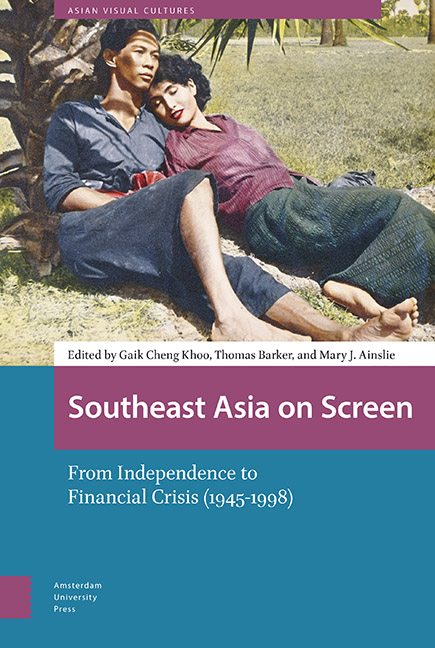Book contents
- Frontmatter
- Contents
- List of Illustrations
- Introduction: Southeast Asia on Screen: From Independence to Financial Crisis (1945–1998)
- Section 1 Independence and Post-World War II Filmmaking: Nation-building, Modernity and Golden Eras
- Section 2 Key Directors
- Section 3 Popular Pleasures
- About the Authors
- Index
10 - Nora Aunor vs Ferdinand Marcos: Popular Youth Films of 1970s Philippine Cinema
Published online by Cambridge University Press: 20 November 2020
- Frontmatter
- Contents
- List of Illustrations
- Introduction: Southeast Asia on Screen: From Independence to Financial Crisis (1945–1998)
- Section 1 Independence and Post-World War II Filmmaking: Nation-building, Modernity and Golden Eras
- Section 2 Key Directors
- Section 3 Popular Pleasures
- About the Authors
- Index
Summary
Abstract
This chapter examines how Philippine actress Nora Aunor's potentially subversive star image was tempered into a safer expression of permissible freedom that also promoted forms of desirable behaviour and values in the 1970s. Such an image functioned to inhibit social and political dissent, indicating how popular films responded to President Ferdinand Marcos's regulation of Philippine cinema during the martial law era. The chapter discusses the role of the studio in ensuring compliance by instituting complementary policies that shaped popular star images and film production. Hierarchies of power and submission were reinforced through Aunor's persona in films that appealed to the lower classes, encouraging noble suffering and acceptance of one's fate.
Keywords: Nora Aunor, Ferdinand Marcos, authoritarianism, youth, Philippine cinema
Introduction
Actress Nora Aunor fan Nestor de Guzman says there were two reasons large crowds could be seen on the streets of the Philippines in the early 1970s: student demonstrations against President Ferdinand Marcos and Aunor's fans headed out to watch her latest film (Llanes 2008). As 1970 began, Aunor and Marcos took very different paths. For Aunor, 1970 was a fruitful year, yielding eighteen films produced by two different studios (Flores 2001, p. 214). For Marcos, a supposedly triumphant 1969 re-election – the nation's first second consecutive term for a president – descended into a chaotic three months known as the First Quarter Storm (Brillantes 1987). While the key to Aunor's success was her youthful appeal to the poor masses, the root of Marcos's troubles were also the youth and poor masses, specifically in the form of disenfranchised labourers and farmers reeling from the Philippines's debt and inflation brought about as a direct result of Marcos's expensive campaign for re-election the year before (Celoza 1997). The First Quarter Storm refers to the series of ‘demonstrations, rallies and strikes spearheaded by the student movement’ and joined by workers and farmers during the opening months of 1970 that resulted in the injury and the death of several students over the course of the year (Brillantes 1987, pp. 47-48).
- Type
- Chapter
- Information
- Southeast Asia on ScreenFrom Independence to Financial Crisis (1945–1998), pp. 215 - 232Publisher: Amsterdam University PressPrint publication year: 2020



